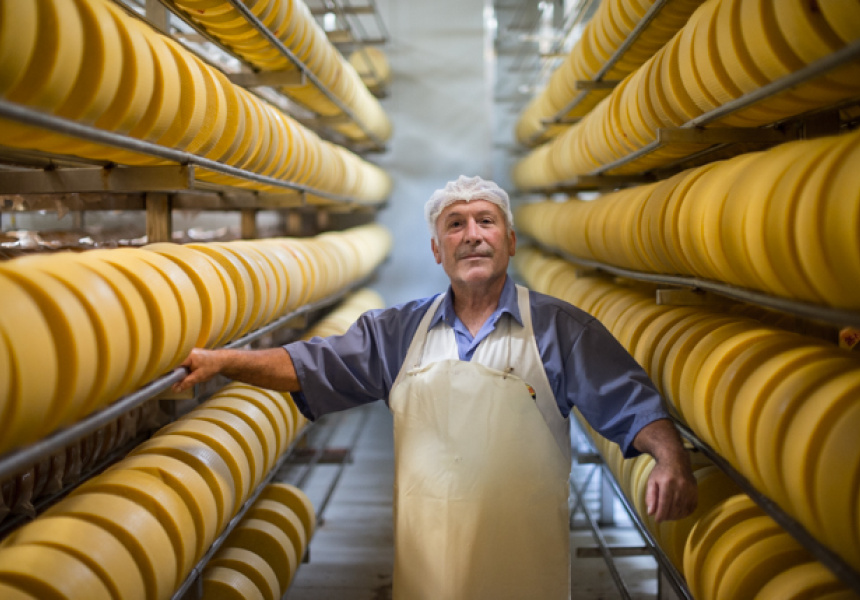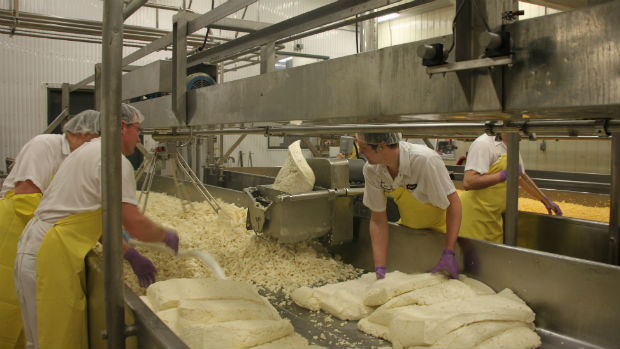Cheese Makers Melbourne: Crafting the Finest Cheeses Locally
Cheese Makers Melbourne: Crafting the Finest Cheeses Locally
Blog Article
A Thorough Appearance at Cheese Production: Active Ingredients, Approaches, and the Future of Artisan Cheeses
The intricate process of cheese manufacturing is a remarkable convergence of art and science, where top notch milk, rennet, and details microbial cultures offer as foundational aspects. As the industry increasingly focuses on sustainability and transparency, the future of artisan cheeses promises to reflect both heritage and progress.
Key Ingredients in Cheese Manufacturing
A variety of important active ingredients play a crucial function in cheese manufacturing, each adding to the last item's taste, texture, and personality. The primary component in cheese is milk, which can originate from different resources, including cows, goats, and sheep - cheese shop melbourne. The sort of milk made use of dramatically influences the cheese's taste and consistency; as an example, cow's milk generally generates creamier cheeses, while goat's milk usually creates tangy ranges
Another vital ingredient is rennet, an enzyme used to curdle the milk, separating it into curds and whey. The resource of rennet can be animal, vegetable, or microbial, each presenting unique features to the cheese.
Salt not only boosts the flavor however likewise works as a chemical, inhibiting the development of undesirable germs. In addition, numerous flavor agents, such as herbs, spices, and even smoked timber, can be contributed to create distinct artisanal cheeses. With each other, these components develop the foundation of cheese production, setting the stage for diverse and rich cheese ranges.
Conventional Cheese-Making Methods
Utilizing traditional cheese-making strategies, artisans around the world preserve classic approaches that have actually been given with generations. These techniques usually emphasize making use of top quality, locally sourced milk, which is main to the special tastes and structures of artisanal cheeses. The procedure generally starts with the mindful home heating of milk, followed by the enhancement of cultures and rennet to facilitate coagulation.
When the curds create, they are reduced, allowing whey to drain pipes, a vital step that influences moisture web content and structure. The curds are then gently mixed and prepared to achieve the preferred suppleness. Later, they are drained and pressed right into mold and mildews. Salting is a vital element of this procedure, boosting flavor while also functioning as a chemical.
Aging, or affinage, is another important part, during which cheeses establish their particular aromas and preferences. Craftsmens might utilize particular aging atmospheres, using moisture and temperature level controls to refine celebrity's profile. The dedication to these typical approaches not just sustains local economic situations however likewise adds to the rich variety of cheese ranges discovered around the world, commemorating cultural heritage and artisanal workmanship.
Modern Innovations in Cheese Manufacturing
Exactly how have technical advancements changed cheese production recently? The integration of modern innovation has changed both the efficiency and quality of cheese manufacturing. Automation in various stages of the process-- from curd development to packaging-- has actually improved uniformity while decreasing labor costs. For example, automated curd cutting and mixing systems permit precise control over appearance and wetness degrees, vital aspects affecting the last product.
Additionally, innovations in microbiology have allowed cheesemakers to choose specific microbial societies and enzymes, maximizing taste profiles and enhancing life span. The use of sensing unit innovation for keeping track of fermentation problems has additionally become common, enabling real-time adjustments to preserve optimal atmospheres for find more cheese aging.

These developments not only enhance the quality and sustainability of cheese production however also encourage artisan producers to keep conventional tastes while accepting modern-day effectiveness. As innovation remains to progress, the future of cheese manufacturing looks encouraging, blending tradition with advancement.
The Role of Terroir in Cheese
In the realm of cheese production, terroir plays a pivotal role in specifying the distinct features of various cheeses. Terroir, a French term generally connected with red wine, incorporates the environmental aspects that influence farming products, including dirt composition, environment, and local plants and animals. In cheese-making, the special attributes of the region where the milk is sourced can impart specific tastes and appearances to the last item.
For example, the grazing conditions of milk animals substantially affect the milk's composition, influenced by the types of yards and herbs available in a specific place. This varies not only in between nations yet likewise in between regions within the exact same country. In addition, the microbial areas present in the environment contribute to the fermentation procedures, leading to diverse profiles in flavor and scent.
Cheeses such as Roquefort, Parmigiano-Reggiano, and Cheddar exhibit just how terroir can form their identifications, making them distinctive and typically shielded by geographical indications. As producers progressively identify the relevance of terroir, there is an expanding focus on sourcing local components and maintaining conventional practices, making certain that each cheese truly reflects its origin.

Future Patterns in Artisan Cheeses
A remarkable change is occurring in the craftsmen cheese industry, driven by evolving customer preferences and technical developments. Increasingly, customers are gravitating towards distinct, high-quality items that emphasize both sustainability and neighborhood sourcing - cheese for sale online. This pattern is prompting artisan cheesemakers to introduce, focusing on small-batch manufacturing and making use of conventional techniques while incorporating modern technology to boost high quality and safety
Moreover, there is an expanding rate of find interest in plant-based and alternative milk products, pressing standard cheesemakers to explore brand-new avenues, such as cashew or almond-based cheeses. This change not only accommodates dietary restrictions but also aligns with ecological issues pertaining to animal farming.
In addition, transparency in sourcing and production processes is ending up being paramount. Consumers are much more enlightened and need traceability, motivating producers to adopt clearer labeling techniques and participate in storytelling that highlights read the full info here their methods and values.
Final Thought
Finally, the intricate process of cheese manufacturing combines typical techniques with modern advancements, causing a varied range of flavors and structures. The focus on high-quality components and the impact of terroir emphasize the artistry associated with cheese production. As the sector evolves, a concentrate on sustainability and transparency will likely shape the future of artisan cheeses, satisfying a progressively discerning consumer base that values authenticity and craftsmanship in milk items.
Report this page